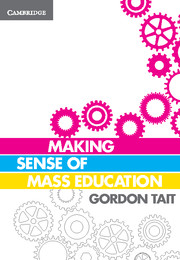Book contents
- Frontmatter
- Contents
- Acknowledgements
- INTRODUCTION
- PART 1 RE-ASSESSING THE THREE PILLARS: MODERN AND POSTMODERN SOCIOLOGIES OF EDUCATION
- PART 2 THE FOUNDATIONS OF AN ALTERNATIVE APPROACH: EDUCATION AND GOVERNANCE
- PART 3 CULTURAL CONTEXTS OF CONTEMPORARY EDUCATION
- CHAPTER 7 THE MEDIA
- CHAPTER 8 POPULAR CULTURE
- CHAPTER 9 TECHNOLOGY
- PART 4 PHILOSOPHY AND MASS EDUCATION
- CONCLUSION
- References
- Index
CHAPTER 9 - TECHNOLOGY
from PART 3 - CULTURAL CONTEXTS OF CONTEMPORARY EDUCATION
- Frontmatter
- Contents
- Acknowledgements
- INTRODUCTION
- PART 1 RE-ASSESSING THE THREE PILLARS: MODERN AND POSTMODERN SOCIOLOGIES OF EDUCATION
- PART 2 THE FOUNDATIONS OF AN ALTERNATIVE APPROACH: EDUCATION AND GOVERNANCE
- PART 3 CULTURAL CONTEXTS OF CONTEMPORARY EDUCATION
- CHAPTER 7 THE MEDIA
- CHAPTER 8 POPULAR CULTURE
- CHAPTER 9 TECHNOLOGY
- PART 4 PHILOSOPHY AND MASS EDUCATION
- CONCLUSION
- References
- Index
Summary
This chapter argues that the advent of contemporary information and communication technologies is normally presented as one of the great success stories of contemporary schooling, and while it has the potential to be a transformative force within education, the issues are complex and the outcomes far from certain. The field is often divided into those who grew up with such technologies – digital natives/students – and those who have come to these technologies at a later date – digital immigrants/teachers. This binary articulates a central problem within a power relation where teachers are normally expected to know more than those they teach.
Furthermore, such new technologies do not simply represent mechanisms for accessing more information, more quickly, and in more interesting ways. By stepping outside the domain of traditional linear texts, traditional understandings of literacy start to lose their meaning. New digital technologies necessitate the adoption of the notion of ‘multiliteracies’, a plural understanding of literacy that encompasses a range of other modes of contemporary meaning-making – hypertext, audio, video, and so on – modes integral to the digital universe.
Myth #1 Digital technology is the answer to all our education problems
Computers don't know if you're rich or poor; or male or female; or even a refugee. Inequalities of educational access are a thing of the past. Just log in and learn.
Digital technology does not guarantee an excellent learning experience; in fact, there are arguments to suggest quite the reverse. Furthermore, such technologies can exacerbate issues of educational inequity, regarding who has access, who has the necessary skills, who actually gets to use them, and who uses them in ways that prove to be educationally and economically productive.
- Type
- Chapter
- Information
- Making Sense of Mass Education , pp. 187 - 204Publisher: Cambridge University PressPrint publication year: 2012



